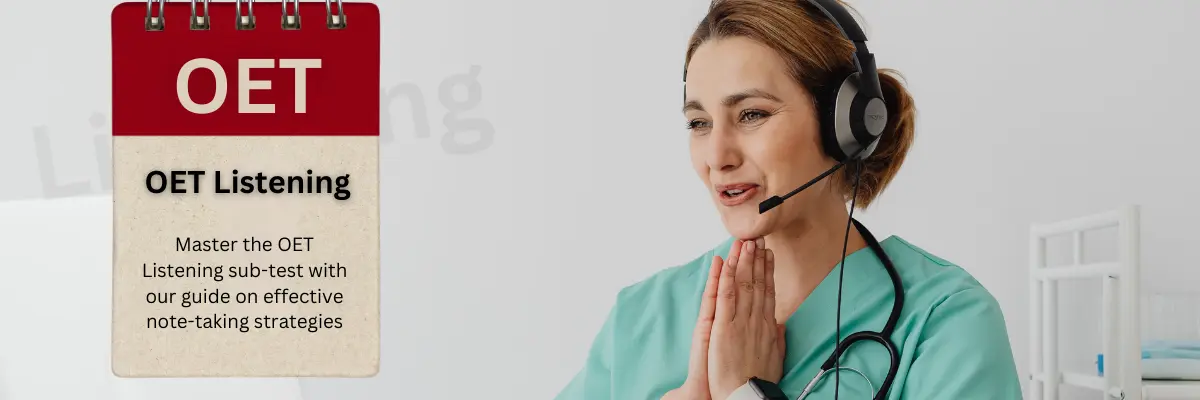13 Jul 2024 | Effective Note-taking Strategies for the OET Listening Sub-test
0
107
Benefits of Studying Abroad
Studying abroad is a transformative experience that opens up numerous opportunities for academic excellence, cultural immersion, and personal growth. For healthcare professionals aiming to work or study abroad, passing the Occupational English Test (OET) is crucial. One of the challenging components of the OET is the Listening sub-test, which requires effective note-taking skills. This article provides valuable insights into effective note-taking strategies for the OET Listening sub-test, along with preparation tips, practice techniques, and exam tips to help you succeed in your study abroad journey. Studying abroad offers numerous advantages beyond academics.
Academic Excellence: Access to top-tier educational institutions and diverse academic programs.
Cultural Immersion: Experience new cultures, traditions, and languages.
Global Network: Build connections with peers and professionals from around the world.
Personal Growth: Develop independence, adaptability, and problem-solving skills.
Understanding the OET Exam
The OET exam assesses the English language proficiency of healthcare professionals who seek to register and practice in an English-speaking environment. It focuses on language skills within a healthcare context.
Listening: Comprehension of spoken English in healthcare settings.
Reading: Understanding written texts relevant to healthcare.
Writing: Writing a letter in a professional healthcare context.
Speaking: Participating in role plays based on healthcare scenarios.
The Importance of Listening Skills in the OET
Listening skills are crucial for clear and effective communication in healthcare settings.
Patient Care: Accurate listening ensures understanding of patient concerns and instructions.
Professional Communication: Effective listening enhances communication with colleagues and other healthcare professionals.
Comprehension: Strong listening skills aid in comprehending complex medical information and instructions.
The Listening sub-test consists of three parts, each designed to assess different aspects of listening comprehension in a healthcare context.
Part A: Consultation extracts (two dialogues between a healthcare professional and a patient).
Part B: Short workplace extracts (six short dialogues or monologues).
Part C: Presentation extracts (two long presentations on healthcare topics).
Note-taking Strategies
Familiarize Yourself with the Format
Understanding the format of the Listening sub-test is essential for effective note-taking.
Review the Structure: Familiarize yourself with the types of questions and the layout of each part.
Identify Key Information: Learn to identify key information such as names, dates, and medical terms.
Develop a Systematic Approach
Using a systematic approach to note-taking helps you capture relevant information efficiently.
Abbreviations and Symbols: Develop a set of abbreviations and symbols to save time.
Keywords: Focus on writing down keywords and essential phrases.
Headings and Subheadings: Organize your notes using headings and subheadings for clarity.
Practice Active Listening
Active listening involves fully concentrating, understanding, and responding to what is being said.
Focus on the Speaker: Pay close attention to the speaker's words, tone, and emphasis.
Summarize Information: Mentally summarize information as you listen to reinforce understanding.
Predict Content: Try to anticipate what the speaker will say next based on the context.
Use Effective Techniques
Incorporate techniques that enhance your note-taking efficiency.
Mind Mapping: Create mind maps to visually organize information and show relationships between concepts.
Cornell Method: Divide your paper into sections for notes, keywords, and summaries.
Outlining: Use bullet points and indentation to create an outline of the information.
Practice Strategies for Note-taking
Use Authentic Audio Materials
Practicing with authentic audio materials helps you become familiar with real-life healthcare scenarios.
Medical Podcasts: Listen to medical podcasts to improve your listening skills and note-taking ability.
Healthcare Dialogues: Practice with recordings of healthcare dialogues and consultations.
OET Practice Tests: Use OET practice tests to simulate exam conditions and improve your skills.
Focus on Healthcare Scenarios
Practicing with healthcare scenarios helps you become familiar with the language and context used in the OET.
Role Plays: Engage in role plays with peers to simulate real-life healthcare scenarios.
Case Studies: Listen to and discuss case studies to practice understanding patient histories and medical conditions.
Clinical Presentations: Listen to clinical presentations and lectures to improve your ability to follow complex information.
Review and Reflect
Reviewing and reflecting on your practice sessions helps you identify areas for improvement.
Self-Review: Review your notes after each practice session to ensure accuracy and completeness.
Feedback: Seek feedback from peers or tutors to identify strengths and weaknesses.
Reflection: Reflect on your note-taking process and make adjustments as needed.
Exam Tips for the OET Listening Sub-test
Understand the Task Requirements
Ensure you fully understand the task requirements before you start listening.
Read Instructions Carefully: Thoroughly read and analyze the instructions provided.
Highlight Key Information: Identify and highlight the most relevant information.
Plan Your Listening Strategy
Planning your listening strategy helps you stay focused and organized during the test.
Preview Questions: Preview the questions before listening to know what information to focus on.
Take Notes: Take concise notes while listening to help remember key details.
Review Answers: Review your answers and ensure they align with the questions.
Stay Calm and Focused
Maintaining calm and focus is crucial for effective listening and note-taking.
Deep Breathing: Practice deep breathing techniques to stay calm and focused.
Positive Mindset: Maintain a positive mindset and believe in your ability to succeed.
Pace Yourself: Pace yourself throughout the test to ensure you stay on track.
Conclusion
Effective note-taking is essential for healthcare professionals preparing for the OET Listening sub-test. By understanding the format, developing a systematic approach, practicing active listening, and using effective techniques, you can enhance your note-taking skills and perform well in the exam. Remember to use authentic audio materials, focus on healthcare scenarios, and review and reflect on your practice sessions.
For more assistance, please visit our study abroad consultancy services and explore our wide range of offerings for students interested in studying in the USA, studying in the UK, studying in Canada, studying in Australia, studying in Ireland, and many other countries.


